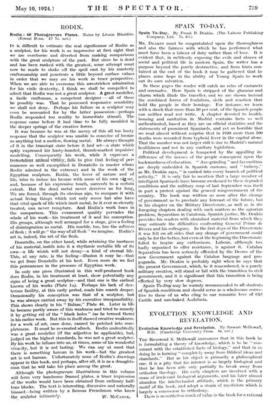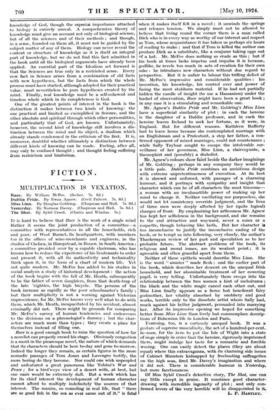EVOLUTION KNOWLEDGE AND REVELATION.
Tim Reverend S. McDowall announces that in this book he is formulating a theory of knowledge, which is to be " con- sonant with the established facts of biology," and that in so doing he is turning " completely away from Biblical ideas and standards." But as his object is primarily a philosophical one, it is a pity that his interest is so largely biological and that he has been able only partially to break away from orthodox theology. His early chapters are involved with a mass of irrelevant biological arguments, and his later almost abandon the intellectualist attitude, which is the primary motif of the book, and adopt a strain of mysticism which is largely a concession to orthodoxy.
There is nevertheless much of value in the book for a rational
knowledge of God, though the especial importance attached to biology is entirely unreal. A comprehensive theory of knowledge must give an account not only of biological science, but of all the sciences and of their methods ; and though, in a sense, founded on them all, it must not be guided by the subject matter of any of them. Biology can never reveal the content or structure of knowledge as it is itself an integral part of knowledge, but we do not find this fact admitted in the book until all the biological arguments have already been applied. An essential part of the Idealism set forward is that the Sciences are true only in a restricted sense. Every new fact in Science arises from a combination of old facts with new hypotheses, but the facts from which the whole process must have started, although adopted for their practical value; must nevertheless be pure hypotheses created by the mind. Finally, real knowledge must be a self-coherent and timeless whole which in its completeness is God.
One of the greatest points of interest in the book is the distinction it makes between two kinds of knowing : the one practical and limited as exemplified in Science, and the other absolute and spiritual through which other personalities, and particularly that of God, are known. Unfortunately, however, the second kind of knowledge still involves a dis- tinction between the mind and its object, a dualism which already stands condemned in the criticism of the first. It is, moreover, doubtful whether ultimately a distinction between different kinds of knowing can be made. Feeling, after all, may only be confused thought ; and thought feeling suffering from restriction and limitation.







































 Previous page
Previous page